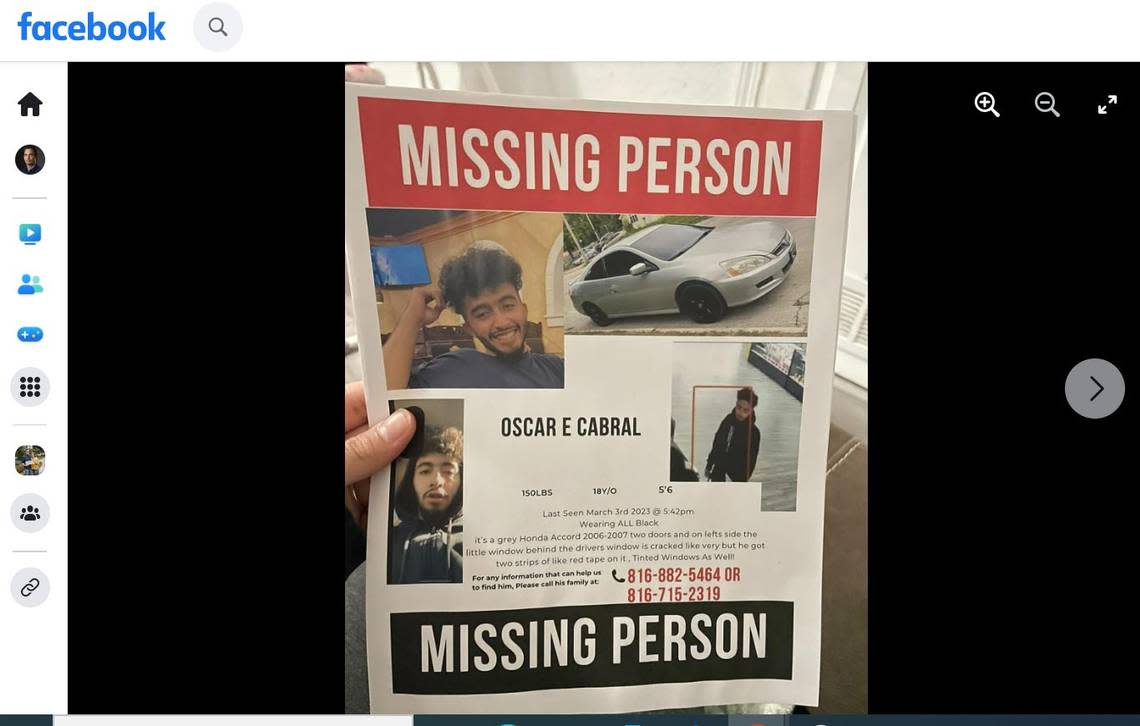For 5 days, KCPD didn’t alert public of missing 18-year-old. He was found dead Thursday

In the five days from the time Oscar Cabral’s family reported him missing to the day his body was found last week, Kansas City police did not alert the public that a search was on for him.
The 18-year-old had been missing since leaving home at 5:42 p.m. on March 3, according to a missing persons flier that the family released over social media.
Family members reported his disappearance to police March 18. Police took a report but did not post his photo on social media or send out a news release to engage the public’s help in finding him.
The Kansas City Police Department said Cabral did not meet the department’s criteria for an active missing persons case.
On Thursday morning, utility workers discovered his body off a two-lane road near the heavily wooded trails inside Swope Park. Police have not provided details of how he died but have said they are investigating his death as a homicide.
Kansas City police have faced criticism in recent months for their handling of missing persons cases.
The discovery of Cabral’s body came about two weeks after the body of 13-year-old Jayden Robker was found in a pond near his Northland neighborhood. In that case, the police department had waited four days to put out a public alert that he had been reported missing. Police have said in Jayden’s case that the initial autopsy results did not show obvious evidence of foul play.
Families, social activists and neighborhood leaders say police are often not responsive to their concerns, especially in cases of missing people who are Black. Advocates have said the police department does not consistently follow the best practices in responding to reports of missing people.
Many advocates who study the best practices in the field say every department should have strategies for alerting community members of missing persons and communicating with them during a search.
Cabral reported missing
Police have said that when Cabral was reported missing March 18, the department took a report.
His information was listed in the National Crime Information Center or NCIC and the state’s crime information system also known as MULES.
Federal authorities require police departments and other law enforcement agencies to report missing persons under the age of 21 as part of the Suzanne’s Law requirement.
But after those entries were made in the databases, it is not clear what efforts the police made to locate Cabral.
Capt. Corey Carlisle, a police spokesman, told The Star in an email Monday that the department actively looked for Cabral after he was reported missing. But Carlisle declined to say specifically what police did, citing the ongoing homicide investigation.
Carlisle said the department did not circulate a public flier because Cabral’s disappearance did not meet the KCPD’s criteria for that step.
The criteria include information that the missing person is under medical are, has mental health concerns, may be suicidal, has diminished mental capacity, has dementia or there is a strong indication of foul play.
Carlisle said police did not submit a missing person’s report to the National Missing and Unidentified Persons System, or NamUs, a national publicly accessible database of missing persons. Some advocates say police should enter missing people into the NamUs system as a standard procedure.
Before his death, Cabral was spotted at 7:42 p.m. on March 17 near 4124 Northeast Vivion Road, otherwise known as Penguin Park, wearing blue sweatpants and a thick, gray sweatshirt with a zipper, according to a family member’s message over social media.
In response to questions about the Cabral case, police spokesman Sgt. Jacob Becchina provided a statement in writing:
“KCPD handles missing teens in accordance with our department policies and state statutes that pertain to missing persons.”
Criticism of KCPD missing persons investigations
In recent months, advocates and experts have pointed to best practices in missing persons investigations that Kansas City police do not follow.
The police department does not maintain a list of active missing person cases that is accessible to the public. It does not require the missing persons unit to file monthly reports tracking which cases are being closed or going unsolved, and it does not track the demographics of missing persons.
As a result, those who provide support to families of the missing say it’s nearly impossible to know what resources police are using to search for specific missing persons, or whether Black and brown communities are being disproportionately affected.
In Kansas City, it is left to detectives to decide whether individual cases are worth pursuing, based on whether that person is in immediate danger or might harm themselves, police say.
In Missouri, there is no statewide standard or protocol for investigating missing persons cases.
A bill in the Missouri House of Representatives filed by Republican Adam Schnelting of St. Charles County, would require police to report their missing to NamUS. Similar legislation has already been enacted in 13 states from Oklahoma to New York.
The Star’s Matti Gellman contributed to this report.

 Yahoo Movies
Yahoo Movies 
